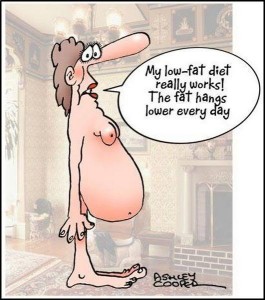Several recent studies show that a low fat diet can stop or reverse coronary heart disease, but keeping in mind that ‘cholesterol-free’ is not the same as ‘fat-free’ and that, teaspoon for teaspoon all fats contain about the same number of calories. Of course, there is no such thing as ‘low-fat’ fat.
Coconut and palm oil contain no cholesterol but are high in saturated fat, which is to be avoided and though salt is the major contributor of sodium to our diets; sodium and salt are not the same. A teaspoon of table salt contains 2,300 milligrams of sodium.
You need enough calories in your diet to provide energy, but you don’t want your body to take in more calories than it can burn off. This is called balancing your energy. If you take in more calories than your burns off, you will get fat, but if you take in fewer calories, you lose weight. If you balance your intake of calories with the amount you burn off, you maintain your weight. Even when dieting you shouldn’t cut back on your caloric intake to the degree that you lose energy and the number of calories your body needs primarily depends on your age, sex and level of physical activity.
Dietary cholesterol is a fatty substance found in all non-vegetable foods: egg yolks, meat, poultry, fish, milk and dairy products such as cheese and yogurt. Because our bodies manufacture its own cholesterol, cholesterol is not a requirement in our diet. However, because most people eat foods that do contain cholesterol it is important to avoid excessive amounts. The amount of cholesterol you consume obviously affects the level of cholesterol in your blood.
Fat is the most concentrated source of calories, supplying more than twice as many calories per gram as either carbs or proteins. Americans tend to eat far too much fat, which contributes significantly to health problems such as obesity, high blood pressure and heart disease. Fatty acids are the basic chemical units in fat. They may be saturated, polyunsaturated, mono-unsaturated, or trans-fats. These particular fatty acids differ in their chemical compositions and structures and in the way in which they affect a person’s blood cholesterol level. Your total fat consumption should not be more than thirty percent of your daily caloric intake. Some foods which contain the most far are: meats, butter, cocoa butter, coconut and palm oils.
The liver uses saturated fat to manufacture cholesterol and saturated fat is considered the most dangerous kind of fat because it has been shown to raise blood cholesterol levels. Saturated fat should comprise no more than 10 percent of your daily caloric intake. Polyunsaturated fats, such as vegetable oils and margarines, don’t appear to raise blood cholesterol levels. Foods containing Polyunsaturated fats include: safflower, sunflower, corn, and soybean oils. Monounsaturated fats, such as olive oil, don’t seem to have any affect on blood cholesterol. Examples include olive and canola oils.
Trans-fat is a by-product of hydrogenation, a chemical process used to change liquid unsaturated fat to a more solid fat. Structurally similar to saturated fat, trans fatty acids may have a great impact on raising total cholesterol levels. Examples include stick margarine and fats found in commercially prepared cakes, cookies, and snack foods.
Fiber is the indigestible portion of any food. There are two types of fiber: soluble and insoluble. Soluble fiber, found in such foods as oat bran and dried beans, can lower blood cholesterol in some people. Insoluble fiber, found in foods such as wheat bran, has many benefits. While it hasn’t been found to lower cholesterol, fiber is useful in weight control because it creates a feeling of fullness.
Sodium is a mineral needed to maintain body fluids and proper nerve functioning. It occurs naturally in some foods but most of the sodium in one’s diet comes from the seasonings added to food. Although sodium is essential, most people consume more than they need. In some people, too much sodium in the diet can cause their blood pressure to rise and put them at risk of heart disease or strokes.
Lori Victoria Braun – About the Author:
Lori Victoria Braun is the owner and founder of Femalemuscle, the largest website devoted to female bodybuilding, fitness, and female athletes. Femalemuscle features thousands of videos, galleries articles, and blogs, updated daily by Braun and other regular contributors. Braun is also an accredited press representative with the IFBB, which is the governing body for all major international bodybuilding
Under Creative Commons License: Attribution

